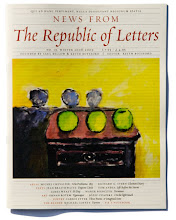She may have been, she may be, a kook, have lactose problems, have shot her brother or not, the two hard facts are: that Prof. Bishop killed several of her colleagues and that she had been denied tenure. I am not much interested in the killing itself -- Amy Bishop is far from being unique in wanting to kill the departmental colleagues who refused her tenure -- but the whole question of tenure is one that sorely need re-thinking.
I take it as stipulated that tenure at the university level -- dreamt up decades ago to protect the market place of ideas and to protect a teacher's right to utter unpopular opinions -- has long been little more than a guarantee of lifetime employment for professors, regardless of the quality of their teaching, their research or their contribution to the education of the young. And I would further stipulate (from long experience in university teaching) that the first thought of the members of any departmental committee engaged in assessing a colleague's suitability for tenure is, how would granting tenure to X affect me. One might accept a brilliant young man or woman as an instructor or even an Assistant Professor -- such people don't take much of the budget -- but as a colleague for life?
The process is slow, it is laborious -- department, provost, president, trustees -- and much more likely to reflect mediocrity than to promote excellence. As we know from the electorate at large, like favors like: women will vote for women, minorities for minorities, and dullards for dullards. The last thing any university department wants is someone who will rock their cozy craft. A productive scholar is an implicit criticism of the unproductive; a reputation outside the department arouses envy.
In the most recent case I can recall, a composer of genuine musicality, much loved by his students, much performed outside of the university's own concert halls, was denied tenure for fourteen years. The composers on his committee all, save one, knew their own talents were more modest; the candidate did not fit the kind of music which forms the current (outdated) orthodoxy of composition classes. The musicologist member thought the matter through and saw that more students were now studying to be composers than considering such arcanae as the manuscripts of seventeenth century Spaniards. The teachers of various instruments wondered whether a composer might upset the way in which they recruited profitable paying students from Taiwan, and so on down the line.
University departments are now, as the nation is, a set of interests. They are like Greek civil servants: better the country should flounder than take a cut in pay.
I don't offer this as a pretext for Professor Bishop's acts, nor is it necessarily so that she was unfairly denied tenure. I merely suggest that the criteria for the granting of tenure are so arbitrary and the results so obviously damaging to education, that perhaps the system out to be scrapped. Unless this is done, dumbing down, useless publications, PhD mills, plodders reading their one text year after year, our universities will continue to decline into the high schools they have become, the talent pool of our universities will fail to be steadily enriched, and the young faculty be forced to conform to the prevailing opinion of their seniors rather than infuse their students with the love of learning that is the only justification for the existence of universities.
Lahti
2 years ago













I'm a tenured associate professor at a midwestern U.S. university. I am about to be the chair of the campus-wide executive committee of the division of the professions, which oversees the process of tenure/promotion for about 1/3 of our campus. I admire the accomplishments of those who have come before our committee, yet even though I have tenure and would hate to lose it, I wonder if we are actually doing good work. Thanks for the thoughtful comments, Keith. Tom
ReplyDelete